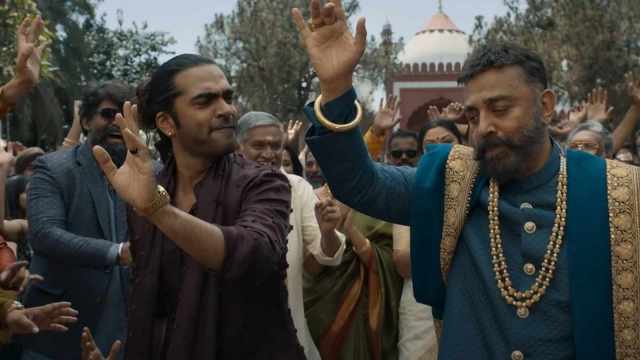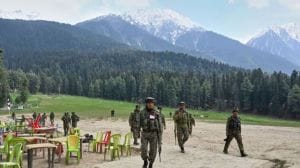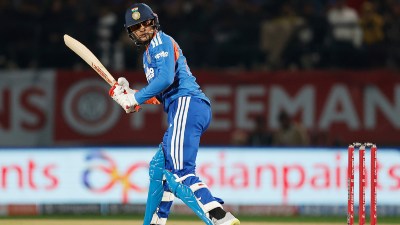Pulling up the Karnataka government and the state high court over Kamal Haasan’s film, Thug Life, not being screened there, the Supreme Court on Tuesday said the rule of law demands that any film cleared by the Central Board of Film Certification (CBFC) should be allowed to be screened, and “mobs and vigilante groups” cannot be allowed to “take over our streets”. It underlined that having a “different view” is part of the freedom of speech and expression.
A two-judge bench of Justices Ujjal Bhuyan and Manmohan was hearing a PIL seeking the SC’s intervention for the smooth release of the film, which faced opposition and threats from some groups in Karnataka following Haasan’s reported remarks that Kannada was “born out of Tamil”.

The SC also criticised the Karnataka HC for asking the actor to apologise for his alleged remarks. “Why should the HC say regret, apologise? It’s not the business of the HC to ask for an apology from anybody just because he has expressed a view,” said Justice Bhuyan. Citing an earlier Bombay High Court judgment which set aside the ban on the play, Me Nathuram Godse Boltoy, he said: “…to have a different view, you can’t stop it. That’s the freedom of speech and expression”.
“We can’t allow mobs and vigilante groups to take over our streets. The rule of law must prevail. (If) somebody has made a statement, reply with a counterstatement. (If) somebody has said something in writing, counter with a writing,” Justice Bhuyan said.
“Rule of law demands that any person should be allowed to release his film. It can’t be at the pain or at the fear of burning down the cinemas that the films will not (be released)… people may not come, may not watch the film. That’s a different matter, that’s up to them. We are not passing an order that please come and watch the film, but the film must be released,” Justice Manmohan said.
“The state is an enlightened state. I’m sure it will not allow mobs and vigilante groups to take over the streets,” Justice Manmohan said.
The bench transferred the proceedings pending before the HC to itself, and fixed it for hearing on Thursday. The SC, which issued notice in the matter on June 13, told the state government’s counsel: “This is an urgent notice issued by the court. You file (the counter-affidavit) by tomorrow. We can’t let this happen.”
Story continues below this ad
The state government counsel pointed out that the film producer had already approached the HC. “So what? We will transfer it here… We can’t allow this to happen,” the SC said.
The state counsel said the producer had assured the HC that he would resolve the issue with the Film Chamber of Commerce, and would not release the film. Saying that the next hearing had been fixed for June 20, the counsel urged the court to let the filmmakers make an effort to resolve it.
However, Justice Manmohan reiterated: “Rule of law demands that people cannot have a gun put to their head and told, unless you resolve it, we will not allow release. The rule of law is important. The state has to ensure that anyone who wants to show a film, that film must be released after it has got a CBFC certification. If you have a CBFC certificate, it is liable to be screened. That’s the law we follow in this country.”
“People may not come and see the film, but the film will always be released. It cannot be that because of the fear of the burning of the cinema halls or because people say that we will do a gherao, the film will not be released,” Justice Manmohan added.
Story continues below this ad
Justice Bhuyan referred to an earlier SC decision to quash the FIR against Rajya Sabha MP Imran Pratapgarhi over a social media post, and said the ruling cited the Bombay HC’s decision to set aside the ban on the play, Me Nathuram Godse Boltoy.
“He had recited a poem and an FIR was registered against him, and we quashed it. In that judgment, we had recorded with approval the full bench decision of the Bombay HC in the ’90s, authored by Justice D Y Chandrachud (former Chief Justice of India),” said Justice Bhuyan.
“There was a Marathi play called Me Nathuram Godse Boltoy, where there were critical references to the father of the nation. There was a hue and cry, and the Maharashtra government banned the play, and directed the seizure of all copies. The HC intervened and set aside that order. It said (Gandhi) may be revered…think of it, he is the father of the nation. But to have a different view, you can’t stop it. That’s the freedom of speech and expression.”
“Will the rule of law depend on the statement of one person? The rule of law demands that any film that has a CBFC certificate should be released, should be allowed to be screened, and the state has to ensure that the rule of law prevails in that state,” Justice Manmohan said.
Story continues below this ad
When pointed out that the HC had asked Haasan to tender an apology, Justice Manmohan said: “Is there something wrong in the system that one person makes a statement, and you believe that statement as if it’s gospel truth. As my brother is saying, let there be a debate on the issue. Let people say he is wrong.”
“Or the enlightened people of Bengaluru can issue a statement that he is wrong, that he doesn’t know anything,” Justice Bhuyan said.
“It’s concerning the rule of law, it’s concerning a fundamental right. Therefore, this court is intervening. That is what the Supreme Court is meant for. We are the custodians of the rule of law as well as the fundamental rights. It’s not just the screening of the film, it’s much bigger than this,” Justice Manmohan said.









